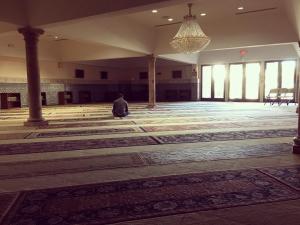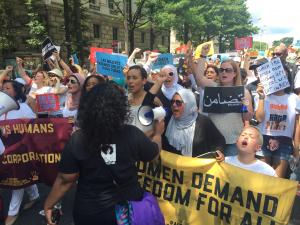
When we typically think of establishing a Muslim community in any city we often think of the brick and mortar part of building a masjid. We raise thousands and in some cases millions of dollars to build elaborate structures and spaces for prayer for our community. However, if we truly look at a majority of the masjids the most the masjid is filled up in is during Friday daily prayers or Ramadan. Daily prayers typically in most masjids have at best two lines filled up completely.
If you were to truly ask masjid leadership what their actual congregational numbers are few masjids would be able to do so. Some may offer paid membership lists as data, but that also is not a true number of how big a congregation truly is. While we build elaborate structures for our communities that largely are under-utilized and mostly extremely expensive to upkeep and maintain our actual community member numbers at each masjid are still largely unknown. In recent times we’ve seen trends of some community members including some men, women, converts, youth becoming “unmosqued.”
So by this point it may be confusing as to why we started discussing congregational numbers and masjid structures in a discussion about imams, but let’s rewind a bit to the establishment of the early Muslim community in Madinah. If you were to ask any Muslim as to what the first act the Prophet Muhammad (peace be upon him) did some if not most would say he built a masjid. In reality even before setting the first brick of the masjid of Madinah the Prophet Muhammad (peace be upon him) he paired the Ansar (the Helpers) and the Muhajir (the immigrants) together. He built a community before setting the foundation of the masjid in Madinah. Unfortunately, in most cases in the US we’ve seen elaborate structures being built and millions of dollars invested in structures, but how many communities have we truly built?
This brings us to the core of the topic of our discussion: what is the future of our imams (and Islam) in America? While it’s important to have places of worship and community centers for Muslims in America, it’s also just as important to have individuals to meet the spiritual and personal needs of the community. Building elaborate and expensive structures with no imams or individuals to build a community is like having a beautiful body without a soul or a heartbeat. Not having an imam at a masjid who focuses on community-building and increasing religious literacy is a gross disservice to the community at large and leaves the congregation without a leader and susceptible to the wrong interpretations of Islam being taught or promoted, potential power vacuums, and an overall lack of direction and guidance for the community.
Some masjid leaders may say: “We’ve already got an imam!” or “That’s easy, we can just hire an imam” However, in reality have we truly empowered the imams we’ve hired? Have we given them the space, authority and the resources to truly do their jobs? Have we set them up for success or failure? It’s unfortunate but for the vast majority of imams in America are underpaid, overworked, and underappreciated. Their salaries are also much less than their religious clergy counterparts in other religious communities. Add the frustration most imams feel when they have to deal with board politics, drama and having their authority and decision-making ability in their communities limited and micro-managed you have a recipe for disaster.
If we continue to create hostile, toxic, unwelcoming and unsustainable environments for imams in our masjids how do we expect to build communities that are religiously literate? Most of may claim to know Islam’s importance in our lives and religious education then why are we not supporting viable careers to those who dedicate their entire lives to learning about our faith? We cannot afford to hand off or trust the education and spiritual guidance of our communities to volunteers who have no formal training or education. While we push our sons and daughters to pursue degrees in technical, medical, legal, and other fields we will only see the religious literacy in our communities diminish significantly. It’s fine if you decide to pursue degrees and careers in other fields and encourage your children to do so, but if you want to see your community flourish and grow then we must invest in our imams and scholars. It’s unfortunate to see some imams and scholars in our communities demeaned to be fundraisers and relegated to travelling for speaking engagements to make ends meet for them and their families. This is truly a tragedy for our community if this is the way we treat those who’ve dedicated their entire lives to learning about Islam.
Some may argue that we have religious speakers, workshops, seminars, and conferences that contribute to religious literacy, but even those are not truly impactful or sustainable to continuously promote religious literacy in our communities. We need imams working day in and day out to meet the needs of our community. Celebrity imams and celebrity speakers who do panel discussions, workshops and conferences intermittently in random communities is not the long-term solution to our lack of religious literacy in our communities. Our community members may get a temporary spiritual high, but who then is meant to keep that spiritual high and cultivate it? A rain shower that randomly occurs may benefit a garden for a couple of days, but who is meant to ensure that the garden grows and healthy? This is the role of an imam who can ensure that growth continues on a more consistent basis than the sporadic workshop, panel discussion, or conference that may occur in a community.
If we fail to create job opportunities for imams and pay competitive salaries with benefits we’ll continue to see a decline in our community’s religious literacy. Discussions and lively debates in our community over CVE have divided some in our community. No matter what side you may be on the issue the most simple solution to countering violent extremist ideology, misinformation and misguidance period is to start investing in imams who are focusing on improving their community members’ understanding of Islam. Not having an imam at a masjid is like having a farm without a farmer or sheep without a shepherd. Without religious guidance or leadership communities become susceptible to misguidance and misinterpretations on Islam. For those masjids that do have imams they should be focusing on Islamic education and be given resources from the masjid boards to effectively teach Islamic belief and practice to every demographic in the community.
It’s unfortunate, but some of us have heard of or experienced the fallouts between imams and masjid boards or we may have heard or witnessed internal politics and drama of masjid boards firing imams or making their lives difficult by not providing them a livable salary, limiting their authority or not giving them the resources to flourish and truly impact the community. We shouldn’t hire imams to be slaves of masjid boards nor should we have imams simply be warm bodies in the masjid to lead prayers and deliver khutbahs. If that’s the extent of their role in the masjid we are doing a huge disservice to our congregations. If we continue down the trajectory we are in not building viable career options for our imams and building institutions to produce high-quality and well-educated imams who are thoroughly educated in Islamic belief and in other key areas to better serve their communities effectively we will continue to see a decrease in masjid attendance and an exodus of Muslims from the masjid (or God-forbid Islam itself), a significant decrease in religious literacy, and empty masjids.
Now that we’ve covered the dire need for viable careers for imams in our masjids let’s get to discussing a couple of solutions. Hiring an imam is easy, but prior to even hiring an imam we need to ask ourselves:
- What demographic is the imam going to be serving?
- What type of imam do we need for your community? For example, if your community is majority students perhaps hiring an imam who is a chaplain would be a good idea or if your masjid has more families a more senior imam may be best to hire who understands family dynamics and has a background in counseling/therapy or mediation.
- What are the roles and responsibilities and expectations of the imam? Are they clear and easy to understand?
- What are the KPIS (key performance indicators) that the imams’ job performance will be measured by?
- What is the authority of the imam and what are his decision-making limitations when it comes to major decisions that impact the community?
- Does your masjid have an HR system, policies and procedures that can mediate between the masjid board/leadership and the imam in cases of conflict between the masjid board and the imam?
- Is your masjid able to afford the salary of an imam to sustain him long-term?
- Are you able to give adequate resources in the form of financial resources, human resources and technological resources to ensure the success of the imam?
- How with the imam’s help and expertise are we going to increase religious literacy in the community?
- How with the imam’s help and expertise will he produce qualified teachers, future students of knowledge, and resources for your community?
These are just a few questions of many that masjid leadership and communities need to ask themselves when thinking of hiring an imam for their community, but at a very fundamental level we need to ask ourselves a couple of questions before even beginning thinking about the above questions: are we stifling the growth of our communities by not creating viable career options for our imams and scholars? Are we to blame for the unmosqued epidemic occurring in our masjids today? Are we contributing to the growth of our communities or are we contributing to the decline of our community? What are ways we can create viable career options for our imams and scholars?
If we don’t ask (and answer) these questions soon we risk the very future of Muslim communities in America. The answer to most of these questions lies in how much we truly value Islamic knowledge. If we truly value Islamic knowledge then it becomes incumbent on us as a community to start investing in our imams and scholars (and institutions producing imams/scholars).












